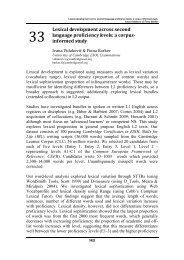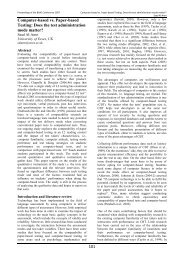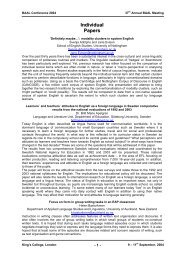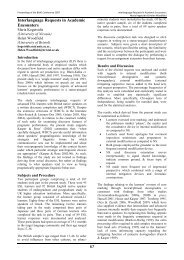The actuality adverbs in fact, actually, really and indeed - British ...
The actuality adverbs in fact, actually, really and indeed - British ...
The actuality adverbs in fact, actually, really and indeed - British ...
You also want an ePaper? Increase the reach of your titles
YUMPU automatically turns print PDFs into web optimized ePapers that Google loves.
Proceed<strong>in</strong>gs of the BAAL Conference 2007 <strong>The</strong> <strong>actuality</strong> <strong>adverbs</strong> <strong>in</strong> <strong>fact</strong>, <strong>actually</strong>, <strong>really</strong> <strong>and</strong> <strong>in</strong>deed- establish<strong>in</strong>g similarities <strong>and</strong> differences<br />
Kar<strong>in</strong> Aijmer<br />
context (the adversative mean<strong>in</strong>g). I själva verket (as a<br />
translation of <strong>in</strong> <strong>fact</strong>) does not necessarily <strong>in</strong>volve a<br />
contrast but rather that there is more to say (Schwenter<br />
<strong>and</strong> Traugott 2000: 18), „Pragmatically Q-implicatures<br />
[say as much as you can <strong>and</strong> no more] are brought <strong>in</strong>to<br />
play <strong>and</strong> cancelled‟. In other words, <strong>in</strong> <strong>fact</strong>2 is used to<br />
cancel the implicature that the proposition is all there is<br />
to say (Schwenter <strong>and</strong> Traugott ibidem).<br />
I själva verket is closely l<strong>in</strong>ked to the orig<strong>in</strong>al <strong>actuality</strong><br />
mean<strong>in</strong>g (what is <strong>actually</strong> or <strong>really</strong> the case; cf the<br />
translation egentligen); on the other h<strong>and</strong> it is never<br />
emphatic <strong>and</strong> it does not have the mean<strong>in</strong>g surprise.<br />
(3) "S<strong>in</strong>ce you mention it, yes, I'd noticed."Celia said<br />
seriously, "<strong>The</strong> time is com<strong>in</strong>g, <strong>in</strong> <strong>fact</strong> it's already<br />
here, when women will do many th<strong>in</strong>gs they have<br />
n't done before."(AH1)<br />
"Eftersom du nämner det, ja, jag har märkt det."<br />
Celia sade allvarligt: "Den tiden kommer, i själva<br />
verket är den redan här, när kv<strong>in</strong>nor kommer att<br />
göra mycket som de <strong>in</strong>te har gjort tidigare."<br />
Schwenter <strong>and</strong> Traugott (2000: 173) describe <strong>actually</strong><br />
as similar <strong>in</strong> mean<strong>in</strong>g to <strong>in</strong> <strong>fact</strong> <strong>in</strong> the adversative<br />
mean<strong>in</strong>g but weaker <strong>in</strong> force on the epistemic scale.<br />
This is clear <strong>in</strong> the follow<strong>in</strong>g example where <strong>actually</strong> is<br />
translated as förresten („come to th<strong>in</strong>k of it‟) with the<br />
added side-effect of non-importance:<br />
(4) "You don't th<strong>in</strong>k she 'll cook cuis<strong>in</strong>e m<strong>in</strong>ceur?"<br />
"Fat hope," she said.<br />
"Actually we 'll be lucky if there 's any d<strong>in</strong>ner at<br />
all."<br />
"Why 's that?" he asked.<br />
‟"Oj, tänk om det blir lite men gott -- det franska<br />
köket?"<br />
"Inbilla dig <strong>in</strong>get", sa hon.<br />
"Vi kan förresten skatta oss lyckliga om det blir<br />
nån middag alls."<br />
"Hurså?" frågade han.‟ (FW)<br />
Really <strong>and</strong> <strong>actually</strong> have verkligen as their most<br />
frequent translation <strong>in</strong>dicat<strong>in</strong>g that they are used not<br />
only to express a high degree of certa<strong>in</strong>ty <strong>and</strong> truth but<br />
rhetorically to <strong>in</strong>sist upon a po<strong>in</strong>t of view <strong>and</strong> to<br />
control the way a message is understood.<br />
(5) Earth is <strong>in</strong>deed the best of all worlds for those<br />
who are adapted to it.<br />
Jorden är verkligen den bästa av alla världar för<br />
dem som har anpassat sig till den.<br />
Verkligen (emphasis) <strong>and</strong> faktiskt (new surpris<strong>in</strong>g<br />
<strong>in</strong>formation) are dist<strong>in</strong>ct mean<strong>in</strong>gs However it is the<br />
translator who decides on an <strong>in</strong>terpretation the basis of<br />
the context whether the adverb is used to mark new,<br />
unexpected <strong>in</strong>formation or simply to emphasise<br />
someth<strong>in</strong>g for pragmatic or rhetorical reasons. <strong>The</strong><br />
mean<strong>in</strong>g verkligen occurred <strong>in</strong> the translations of all<br />
the <strong>adverbs</strong> but is marg<strong>in</strong>al with <strong>in</strong> <strong>fact</strong> which is more<br />
closely l<strong>in</strong>ked with the evidential mean<strong>in</strong>g surprise <strong>and</strong><br />
new <strong>in</strong>formation. <strong>The</strong> follow<strong>in</strong>g example illustrates<br />
<strong>really</strong> with verkligen <strong>in</strong> the translation but <strong>actually</strong><br />
could have been used as well:<br />
114<br />
(6) "Well," he said. "All right. If that 's what you<br />
<strong>really</strong> want."(AT1)<br />
"Jaså", sade han. "All right. Om du verkligen vill<br />
ha det på det viset."<br />
(cf for example if that‟s what you <strong>actually</strong> want)<br />
In <strong>fact</strong> <strong>and</strong> <strong>actually</strong> would fit less well <strong>in</strong> the context<br />
because of the implicature that there is more to say (cf<br />
the translation i själva verket‟as matter of <strong>fact</strong>‟ to<br />
expect mild refutation).<br />
When <strong>really</strong> <strong>and</strong> <strong>in</strong>deed were translated with verkligen,<br />
they seem to be more concerned with the propositional<br />
content than <strong>in</strong> <strong>fact</strong> or <strong>actually</strong>. Really <strong>and</strong> <strong>in</strong>deed<br />
unlike <strong>actually</strong> <strong>and</strong> <strong>in</strong> <strong>fact</strong> were for example also used<br />
as degree modifiers before an adjective. <strong>The</strong> degreemodify<strong>in</strong>g<br />
use of <strong>really</strong> was above all found <strong>in</strong> certa<strong>in</strong><br />
text types. I will come back to this <strong>in</strong> Section 5.<br />
<strong>The</strong> closest equivalents to the core mean<strong>in</strong>g <strong>actuality</strong><br />
<strong>and</strong> reality are represented by translations such as<br />
egentligen, i verkligheten, i realiteten all referr<strong>in</strong>g to<br />
<strong>actuality</strong> (cf Schwenter <strong>and</strong> Traugott <strong>in</strong> <strong>fact</strong>1 ) which<br />
contrasts „with such adverbials as <strong>in</strong> imag<strong>in</strong>ation, <strong>in</strong><br />
law <strong>and</strong> participate[s] <strong>in</strong> a lexical field encompass<strong>in</strong>g<br />
<strong>in</strong> practice, <strong>in</strong> reality, <strong>in</strong> <strong>actuality</strong>, etc.‟ (Schwenter <strong>and</strong><br />
Traugott 2000: 15).<br />
(7) On Saturdays we get <strong>in</strong>to the car with him <strong>and</strong><br />
drive down to the place where he works. It is<br />
<strong>actually</strong> the Zoology Build<strong>in</strong>g, but we don't call it<br />
that. It is just the build<strong>in</strong>g. <strong>The</strong> build<strong>in</strong>g is<br />
enormous.<br />
‟På lördagarna sätter vi oss i bilen tillsammans<br />
med honom och åker iväg till stället där han<br />
arbetar.Egentligen är det Zoologibyggnaden, men<br />
så kallar vi den <strong>in</strong>te. Den är bara byggnaden.<br />
Byggnaden är enorm.‟ (MA)<br />
<strong>The</strong> synonymy of the <strong>adverbs</strong> <strong>in</strong> this mean<strong>in</strong>g can be<br />
further tested by substitution. We can compare:<br />
It is <strong>actually</strong> the Zoology build<strong>in</strong>g.<br />
It is <strong>really</strong> the Zoology build<strong>in</strong>g.<br />
In <strong>fact</strong> seems to be more marg<strong>in</strong>al as suggested by the<br />
translations (egentligen 1 ex; i verkligheten („<strong>in</strong><br />
reality‟) 1 ex; In <strong>fact</strong> <strong>in</strong> the same context can come<br />
close. However it is used with counterexpectational or<br />
refut<strong>in</strong>g mean<strong>in</strong>g even if the expectation or belief can<br />
be hard to recover.<br />
It is <strong>in</strong> <strong>fact</strong> the Zoology build<strong>in</strong>g.<br />
Indeed never occurred with this mean<strong>in</strong>g (cf Oh 2000:<br />
267).<br />
In <strong>fact</strong> <strong>and</strong> <strong>in</strong>deed also have translations which <strong>in</strong>dicate<br />
that the evidential <strong>and</strong> certa<strong>in</strong>ty mean<strong>in</strong>g can disappear.<br />
<strong>The</strong> new pragmatic mean<strong>in</strong>g is <strong>in</strong>dicated by<br />
translations such as till och med, också, faktum är<br />
(what‟s more, besides, it is a <strong>fact</strong> that) which are<br />
focaliz<strong>in</strong>g. <strong>The</strong> translations make explicit the<br />
<strong>in</strong>terpretation that the speaker reshapes the message by<br />
signall<strong>in</strong>g that what follows is more precise,<br />
rhetorically stronger, more objective, more appropriate<br />
(cf Schwenter <strong>and</strong> Traugott (2000)). Cf Schwenter <strong>and</strong>







